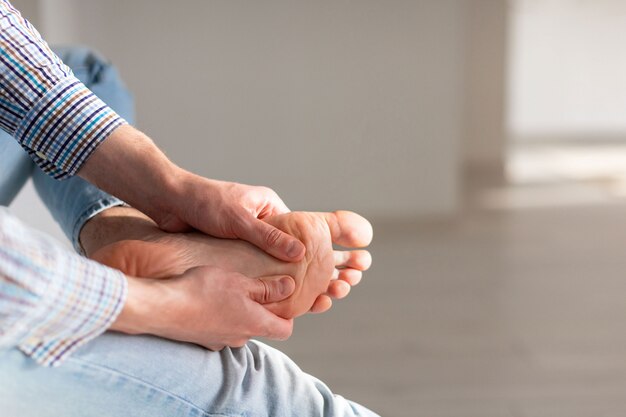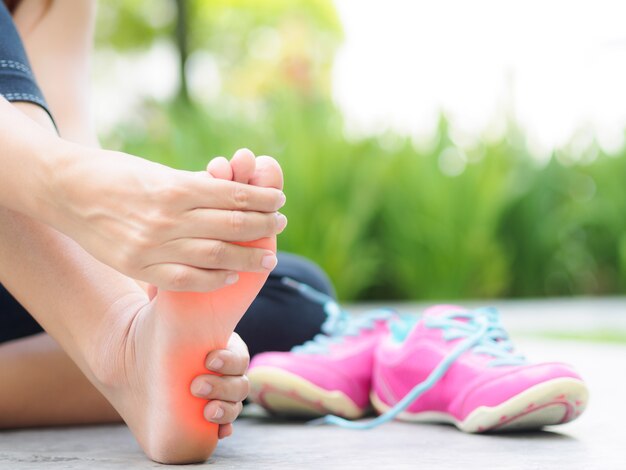Ayurvedic Medicine for Numbness in Feet – Natural Neuropathy Relief

Introduction to Ayurvedic Medicine for Numbness in Feet
Numbness in the feet can be both uncomfortable and limiting, often signaling underlying issues such as poor circulation, nerve damage, or metabolic imbalances. Ayurveda, the ancient Indian system of healing, offers a natural and holistic approach to addressing these concerns. By focusing on balancing the body’s doshas and enhancing overall circulation and nerve health, Ayurvedic treatments provide targeted relief and promote long-term healing. Integrating these remedies into your daily routine can help alleviate numbness, restore vitality, and support overall well-being.
Historical Roots & Ayurvedic Significance
Ayurveda has long recognized the importance of healthy nerves and circulation for maintaining mobility and quality of life. Traditional Ayurvedic texts describe conditions resembling numbness as imbalances in Vata dosha, which governs movement and nerve impulses. Ancient practitioners prescribed specific herbs, dietary guidelines, and therapeutic practices to restore balance and enhance nerve function. The use of Ayurvedic medicine for numbness in feet reflects the broader philosophy of treating the root cause of discomfort rather than merely suppressing the symptoms.
Key Ayurvedic Components for Numbness Relief
Herbal Ingredients
Ayurvedic treatments for numbness in the feet focus on restoring nerve function and improving circulation. Essential herbs include:
- Ashwagandha (Withania somnifera): Known for its rejuvenating properties, Ashwagandha helps reduce stress and supports nerve regeneration.
- Brahmi (Bacopa monnieri): This herb is celebrated for enhancing cognitive and neural functions while improving blood flow.
- Guggulu (Commiphora mukul): Acts as a detoxifier and anti-inflammatory agent that promotes healthy circulation.
- Turmeric (Curcuma longa): With potent anti-inflammatory and antioxidant properties, Turmeric aids in reducing nerve inflammation.
- Ginger (Zingiber officinale): Improves circulation and warms the body, countering the cold nature of Vata imbalance.
Therapeutic Oils and External Applications
Ayurvedic medicine also utilizes medicated oils to stimulate nerve endings and enhance local blood flow. Techniques include:
- Abhyanga (Ayurvedic Oil Massage): Regular massage with warm herbal oils can improve circulation and ease nerve tension.
- Topical Applications: Oils infused with herbs such as Brahmi and Guggulu are applied directly to the affected areas to soothe numbness and promote nerve repair.
Dietary and Lifestyle Adjustments
A balanced diet and lifestyle are critical to supporting nerve health. Ayurvedic recommendations include:
- Warm, Nourishing Foods: Emphasize easily digestible meals that balance Vata dosha.
- Herbal Teas: Teas made from Ginger or Tulsi (Holy Basil) can improve circulation and reduce inflammation.
- Regular Exercise: Gentle activities like yoga and walking enhance blood flow and support overall nerve function.
- Stress Management: Practices such as meditation help calm the nervous system and restore balance.
How Ayurvedic Remedies Work for Numbness: The Healing Mechanism
Ayurvedic medicine works on multiple levels to address numbness in the feet. Herbal formulations restore balance by pacifying aggravated Vata dosha, which is often the root cause of nerve dysfunction. Improved circulation from both internal and external therapies ensures that nutrients and oxygen are efficiently delivered to nerve tissues. Additionally, the anti-inflammatory and detoxifying properties of these herbs help repair damaged nerves and reduce discomfort. This comprehensive approach not only alleviates numbness but also promotes long-term nerve health and overall vitality.
Choosing the Right Ayurvedic Treatment
Selecting the appropriate Ayurvedic remedy for numbness in the feet should involve a personalized consultation with a certified Ayurvedic practitioner. Key considerations include:
- Individual Body Constitution: Understanding your Prakriti (body type) is essential for tailoring the treatment.
- Quality Herbal Products: Opt for high-quality, organic herbs and oils to maximize therapeutic benefits.
- Integrated Approach: Combine internal herbal supplements, external oil applications, dietary modifications, and lifestyle changes for comprehensive care.
- Consistent Practice: Regular use of recommended therapies is crucial for sustained improvement.
Recommended Ayurvedic Practices for Numbness Relief
- Herbal Supplements: Incorporate formulations containing Ashwagandha, Brahmi, and Turmeric to support nerve regeneration.
- Daily Abhyanga: Practice regular oil massages using warm, medicated oils to stimulate circulation in the feet.
- Balanced Diet: Follow a Vata-pacifying diet that includes warm, nutrient-dense foods to nourish the nervous system.
- Gentle Exercise: Engage in yoga and walking to enhance blood flow and maintain overall physical balance.
- Herbal Teas: Enjoy teas made from Ginger or Tulsi to reduce inflammation and promote circulation.
Potential Side Effects & Precautions
While Ayurvedic remedies are generally safe, certain precautions are necessary:
- Herbal Sensitivities: Some individuals may experience mild digestive or skin reactions. Always perform a patch test for topical applications.
- Dosage and Duration: Follow practitioner guidelines carefully to avoid overuse or interactions with other medications.
- Pre-Existing Conditions: Individuals with serious neurological or circulatory disorders should consult a healthcare provider before starting any new treatment.
- Quality Assurance: Ensure that all herbal products are sourced from reputable suppliers to avoid contaminants.
- Gradual Introduction: Begin with lower doses and gradually increase to allow your body to adjust to the new regimen.
Frequently Asked Questions for Ayurvedic Medicine for Numbness in Feet
How does Ayurveda treat numbness in the feet?
Ayurveda treats numbness by addressing the imbalance in Vata dosha with a combination of herbal supplements, medicated oil massages, dietary changes, and lifestyle modifications that improve circulation and nerve function.
What are the most effective herbs for nerve health in Ayurveda?
Effective herbs include Ashwagandha, Brahmi, Guggulu, Turmeric, and Ginger. These herbs help reduce inflammation, improve blood flow, and support nerve regeneration.
Can Ayurvedic treatments be used alongside conventional therapies?
Yes, Ayurvedic treatments can complement conventional therapies. However, it is important to consult both an Ayurvedic practitioner and your healthcare provider to ensure safe integration.
How long does it take to see improvements in numbness with Ayurvedic remedies?
Results vary among individuals, but many notice improvements within a few weeks of consistent treatment. Long-term adherence is key for sustained nerve health.
Are there any side effects associated with Ayurvedic treatments for numbness?
Side effects are typically mild and may include digestive discomfort or skin irritation from topical applications. Always follow professional guidance and start with lower doses to minimize risks.
What lifestyle changes support the Ayurvedic treatment of numbness in the feet?
Maintaining a balanced diet, engaging in gentle exercises like yoga and walking, reducing stress through meditation, and ensuring proper hydration are essential lifestyle practices that support the treatment.
Where can I find authentic Ayurvedic products for numbness relief?
Authentic Ayurvedic products can be obtained from reputable Ayurvedic pharmacies, certified practitioners, or trusted online stores specializing in organic and high-quality herbal formulations.
Conclusion & Expert Insights
Ayurvedic medicine for numbness in the feet offers a comprehensive and natural approach to restoring nerve function and improving circulation. By balancing the Vata dosha through carefully selected herbs, external therapies, and lifestyle adjustments, this holistic system not only alleviates numbness but also promotes long-term nerve health and overall vitality. For personalized treatment and optimal results, consulting a qualified Ayurvedic practitioner is highly recommended.
References & Further Reading
- Lad, V. (2002). Ayurveda: The Science of Self-Healing.
- Sharma, P.V. (1995). Ayurvedic Healing: A Comprehensive Guide.
- National Institute of Ayurveda:
- Journal of Ayurveda and Integrative Medicine for research on Ayurvedic approaches to neuropathy and circulation.
Got any more questions?
Ask Ayurvedic doctor a question and get a consultation online on the problem of your concern in a free or paid mode.
More than 2,000 experienced doctors work and wait for your questions on our site and help users to solve their health problems every day.



